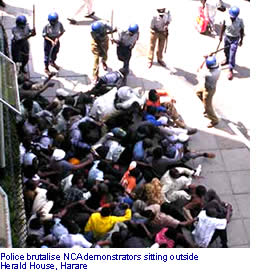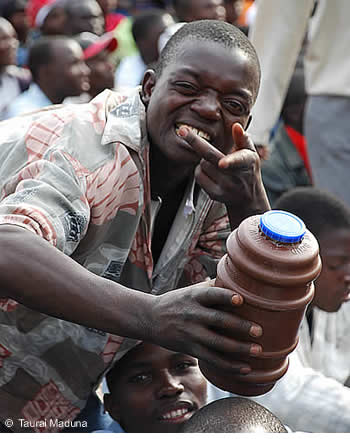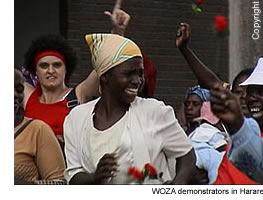Most of the time when I leave my house I’m running, cycling or driving. But I’ve found myself needing to slow down a bit and reflect more lately, so I’ve taken to walking. It’s my favourite time of year here in Harare, summer in all its splendour, and the rains haven’t yet begun. The jacarandas have lost the air of surprise of their first flush, but they are still stunning. There’s a ridge I see when I turn a certain corner and the yellow acacia blossoms, purple jacaranda and green of leaves in between makes me catch my breath every time. The dusty earth is carpeted in yellow, purple and mauve blossoms, and the jacaranda buds pop underfoot.
Walking isn’t without its challenges, of course. Like the man who greeted me on my way home last night: “Hello girl.” I roll my eyes. He pauses. Looks twice. “Are you a girl or? . . .” and trails off laughing to himself. As I continue down the road I overhear him asking the next people he meets – do you think she’s a girl? Is that a girl? I’m not exactly flat-chested or slim-hipped. And I figured the stripey turquoise and cream vest would be a dead giveaway. But clearly not.
I left the office yesterday to go hunting and gathering for some sustenance for myself and a workmate. I bumped into a friend who told me she was working on a proposal to help children process their lives better and to help them develop coping mechanisms to deal with all the emotional and psychological trauma growing up in this place is inflicting on them. She says over half the youth in Zimbabwe are at risk of mental illness. An estimated 40% of the adult population are also suffering from poor mental health.
This doesn’t surprise me.
Take just one example: My best friend mentions she’d quite like to eat some lamb. So I send a text message to a friend of mine who (amazingly enough) is still managing to farm out in Mutare. In addition to some crops, she also runs some sheep. Two days later, I get her reply. She says she’ll sort out my friend’s meat, but it will take a while – they’re lambing now and of course the fluffy little guys have to grow up a bit before they can hit the chopping block. So I say no worries, I’ll tell my mate to be patient, and please can I come see the lambs, they sound too cute. She texts me back straight away:
30 lambs as of yesterday. Gorgeous! You welcome any time. Might have to move whole flock to your garden. Eviction notice yesterday for 4th December.
Of course she’s known this could come at any time. She’s been threatened and violated and harassed in the past, and found a way to reorganise the farm and keep going, at least for some time. She felt a duty to her workers, having seen how farm workers were mistreated on other places that have been taken over. But, like the reorganisation of Foreign Currency Accounts which gives government control over NGO’s and exporters FCA’s, it feels like command, control and subjugate not because you have some bigger plan that will benefit more people or improve the lives of ordinary Zimbabweans, but just because you can.
The gardener where I stay came to me the other day to tell me his son had died – 19 months old, he lived some 250 kilometres away in rural Shurugwi with his grandmother. His father and mother both live and work in Harare. The baby got sick, and the only clinic close enough for them to take him to couldn’t do anything for him. Two days later he died. They postponed the funeral for six days while they waited for the boy’s parents to get transport to the village. When I expressed my shock and sympathies, he shrugged – ndiMwari anotonga, he told me – It’s God who’s in control.
It’s reminiscent of the sentiment I’ve often heard when I’ve asked people what they think will happen here. Zvichanaka they say, things will get better. How? God is in control. When? Some time. Meanwhile, zvakadhakawa. As Alex Magaisa put it, with the price controls and shortages, shifting goal posts and every changing government policies, “that everything appears to be in a state of inebriation aptly captures the uncertainty and lack of direction in desperately uncertain and economically turbulent times.”
Zvakadhakwa – Zvichanaka. Is it any wonder we’re all getting a bit frayed around the edges?
 Not that police brutality is ever acceptable. But treatment of National Constitutional Assembly (NCA) activists this week challenge hopes that talks between Zanu PF and the MDC, and the two parties’ recent agreements on Constitutional Amendment 18, mean a softening in the government’s position on freedom of expression. The state may be planning on revising repressive legislation such as and AIPPA, but in the meantime, freely expressing dissent remains as challenging as ever.
Not that police brutality is ever acceptable. But treatment of National Constitutional Assembly (NCA) activists this week challenge hopes that talks between Zanu PF and the MDC, and the two parties’ recent agreements on Constitutional Amendment 18, mean a softening in the government’s position on freedom of expression. The state may be planning on revising repressive legislation such as and AIPPA, but in the meantime, freely expressing dissent remains as challenging as ever.



 Across Zimbabwe,
Across Zimbabwe, 





